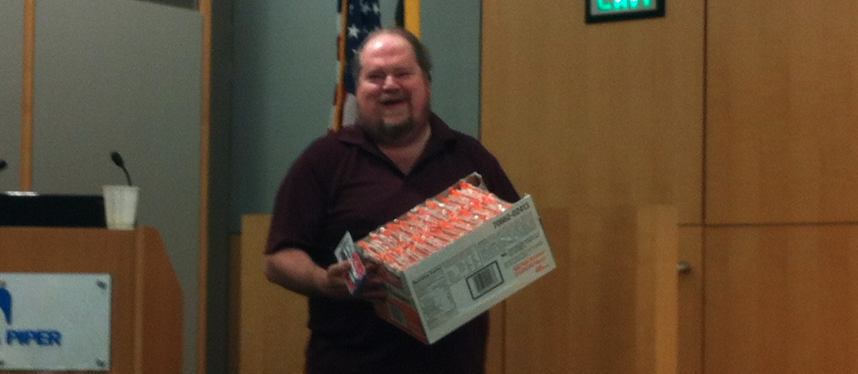Doug Humphrey, with Ramen, at Exec TechBreakfast.
To those who attended the first-ever Exec TechBreakfast on Wednesday morning, Doug Humphrey was introduced as the “father of managed hosting.”
It’s a name that fits. As the cofounder of Digex—which, through one IPO and a subsequent series of acquisitions, is now a part of Verizon—Humphrey was one of the first people to host data on servers for other companies and people. In the years immediately following his graduation from the University of Maryland, College Park, Humphrey was at parties, signing up fellow College Park alums for e-mail accounts at $35 a piece.
(Remember, kids, in those days, once you left college, your e-mail account was turned off. The Internet wasn’t yet the free-for-all series of tubes we now know.)
Watch a video of Humphrey talking about selling the Internet using “colorful fliers”:
[youtube http://www.youtube.com/watch?v=21sagM4_mYg&w=550&h=309]
Humphrey probably has more money than Jesus’ Roman tax collectors. He owns an ex-British naval warship he equipped with speedboats, hella guns and a hot tub that’s now fighting Somali pirates in the Gulf of Aden. “Once you make money,” Humphrey told the nearly 50-person crowd Wednesday, “then you have to exercise the part of your brain that makes you do stupid things.”

But Humphrey—a bearded man who arrived wearing a polo shirt and carting boxes of Ramen, a man who in another life probably could’ve been the body-double for the Big Lebowski—is a man of humble roots.
He moved furniture to pay his way through college. He started Digex in the basement of his house in Greenbelt in Prince George’s County. (Humphrey lives in Laurel now.) Four of his earliest employees lived in his basement.
He kept his day job and worked nights, sinking all his cash into an early-stage startup that had yet to acquire venture capital funding. At one point he passed up a month-and-a-half-long sabbatical his day job offered and instead took straight cash, and then used the money to buy a pair of Sun 4400s.
Picture it: 700 racks in a data center with 42 servers to a rack. Humphrey and Digex didn’t just create a successful data center. They were the first small step in totally rethinking how the Internet could be used for people’s private purposes.
“The point of entrepreneurship is to build success,” he said. “Artists do things for beauty. We start companies to create things for other people.”
It’s something of a mantra for Humphrey, who quite clearly has no time for bullshit:
- The reason behind carting in Ramen? “You’re willing to make the sacrifice to do [this startup.]”
- The reason you’re not getting funded? “A lot of people use [a lack of VC funding] as an excuse. Maybe your idea sucks. Or maybe you suck.”
- The Marylander’s wish to move to Silicon Valley? “If you can’t make your idea fly here, I’m not sure you can make it fly anywhere else.”
For Humphrey, who concluded his own talk with an open Q&A and signed packets of Ramen for all the attendees on their way out, entrepreneurs—and especially ones just starting out—are not stars to be lionized in the press. (Or on your local technology news website.)
Rather, entrepreneurs are people creating things of utility for other people, and working constantly toward the fruition of their goals, irrespective of media coverage, investment funding or the buzz one basks in when countless others know your name.
In a startup, Humphrey said, there’s only room for “working extremely hard.”







